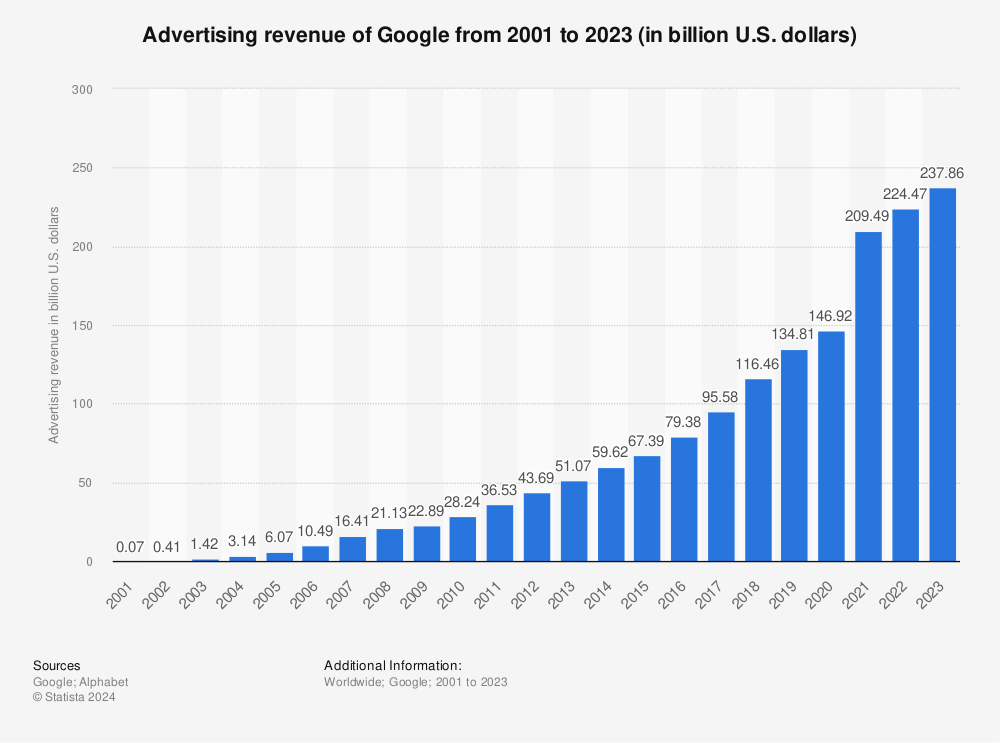There has been enough talk on the impact of AI on jobs, education, society, etc. But one profound change brewing in the background is how it will impact Google Search. Google is already using AI for Search results, but it’s been slow to integrate generative AI like ChatGPT into Google Search for several reasons. One, the leading investor in OpenAI, the creator of ChatGPT, is one of Google’s primary competitors – Microsoft. Google has been slowly rolling out its own AI platform Bard but got caught by the rapid rise of OpenAI’s platform. Finally, Google may be known as a search engine, but in reality, it’s an advertising platform that raked in over $222 billion in 2022. This is a revenue chart no company wants to mess with:
Find more statistics at Statista.
The problem is that no one has found a way to generate massive ad revenue from AI queries. I’m sure we’ll get there soon enough – even OpenAI is wrestling with the astronomical costs of hosting ChatGPT. But until there is a solution, every effort Google makes to enhance Search with AI runs the risk of disrupting its revenue stream.
The Coming Changes in Google Search
But Google has to do something, especially with OpenAI slowly integrating web browsing into ChatGPT for Plus users. Google’s recent I/O event highlighted the expansive changes coming to Google Search. Bard will rely on Google’s newest large language model (LLM) PaLM 2, which offers a broad range of capabilities. According to Sissie Hsiao, VP, and GM of Google Assistant and Bard,
With PaLM 2, Bard’s math, logic and reasoning skills made a huge leap forward, underpinning its ability to help developers with programming. . . Bard can now collaborate on tasks like code generation, debugging and explaining code snippets.
Hsiao continued,
As you collaborate with Bard, you’ll be able to tap into services from Google and extensions with partners to let you do things never before possible.
Those “never before possible” features include Bard connecting to Gmail and Google Docs. That gives Google an advantage over OpenAI, which can only integrate with external platforms through plugins.
All Good News, But . . .
While Google may deny they issued a “Code Red” with the appearance of ChatGPT, a memo and audio recording obtained by the NYTimes suggests that CEO Sundar Pichai has “upended the work of numerous groups inside the company to respond to the threat that ChatGPT poses.” But as good as Bard may get, the revenue challenge remains. Google Search scours the internet for potential answers and gives people what are supposed to be relevant links – a process deeply embedded in Google’s moneymaking Ad framework. ChatGPT essentially does the opposite, delivering unique answers that, while based on web content, were never written by human beings. There are no websites pitching themselves to you, websites that paid for keywords to garner rankings in search results.
How Google Search remains relevant in a world of auto-generated content will be one of the tech dramas of the decade. The industry is littered with the carcasses of once-powerful companies unable to cope with the disruption of new tech developments. Google isn’t likely to join that crowd, but how we pay for our AI-generated content remains a fundamental question of this ever-surprising decade.
Emory Craig is a writer, speaker, and consultant specializing in virtual reality (VR) and generative AI. With a rich background in art, new media, and higher education, he is a sought-after speaker at international conferences. Emory shares unique insights on innovation and collaborates with universities, nonprofits, businesses, and international organizations to develop transformative initiatives in XR, GenAI, and digital ethics. Passionate about harnessing the potential of cutting-edge technologies, he explores the ethical ramifications of blending the real with the virtual, sparking meaningful conversations about the future of human experience in an increasingly interconnected world.

